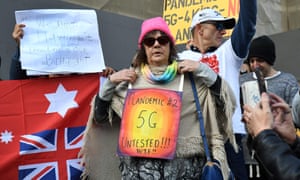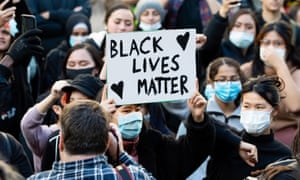As the prime minister says, when it comes to coronavirus advice, consistency is important
I know it is probably mad to yearn for consistency from political
leaders, but indulge my winter madness for a few minutes while we review
some recent events.
On 8 May, Scott Morrison was keen to convey the news that Australia would be reopening in stages between that Friday and July. The prime minister acknowledged that tracking back to normal would likely spark new Covid-19 infections but he said, more than once, this wasn’t something that should slow the trajectory. “Outbreaks are not a reason to slow things down,” Morrison said. “Outbreaks are going to happen, all premiers and chief ministers understand that.”
Should the states hold their nerve if the resumption of normal activity brought new clusters of infections? “Yes,” Morrison replied. Just in case we missed it, the chief medical officer, Brendan Murphy, also echoed the line. “The important thing is not the size of the outbreak, the important thing is the response.”
But at a point in time this week, Morrison’s story changed.
Apparently the risk of new clusters could be a factor in how fast things
moved if the clusters emerged from a Black Lives Matter protest.On 8 May, Scott Morrison was keen to convey the news that Australia would be reopening in stages between that Friday and July. The prime minister acknowledged that tracking back to normal would likely spark new Covid-19 infections but he said, more than once, this wasn’t something that should slow the trajectory. “Outbreaks are not a reason to slow things down,” Morrison said. “Outbreaks are going to happen, all premiers and chief ministers understand that.”
Should the states hold their nerve if the resumption of normal activity brought new clusters of infections? “Yes,” Morrison replied. Just in case we missed it, the chief medical officer, Brendan Murphy, also echoed the line. “The important thing is not the size of the outbreak, the important thing is the response.”
Asked by the Melbourne radio host Neil Mitchell whether governments would be easing things a bit more quickly if the rallies hadn’t happened this past weekend, Morrison was equally declarative. “Yes,” he said. “No doubt”. About an hour earlier on 2GB in Sydney, Morrison described the rallies as the “only legitimate block” to easing restrictions because a cluster of new infections might emerge.
Now why is the opposite also true? Perhaps the best explanation is the simplest one. Perhaps Morrison indulged in a bit of rhetorical overreach on May 8. His bullish suggestion that governments would, or should, push on with easing of restrictions in the face of evidence this really wasn’t a great idea always seemed more like political flourish than reality, and academic in any case, given in our federation the premiers control the timing.
But when you begin to catalogue contradictions, you’ll find they keep coming.
Take the borders. Morrison said this week he’s worried about a new cluster of infections as a consequence of the Black Lives Matter protests (remembering that 8 May Scott Morrison wasn’t worried about clusters in other contexts because that’s the price of life returning to normal). But the prime minister also wants the states to press ahead and reopen their borders, pronto. So are we worried about the consequences of the recent mass gatherings, or not? Try and divine the logic here. Go on. I’ll wait.

Now it’s true the earlier assemblies were much smaller than the gatherings to protest Indigenous incarceration, and that fact obviously influences the public health risk assessment, but those anti-lockdown protests happened when the health restrictions were tougher. Yet the prime minister was sanguine. “It’s a free country. People will make their protests and their voices heard,” Morrison said at the time – noting it was up to authorities to ensure things remained within the bounds.
So we’ve washed up in a mildly surreal universe where clusters both are and aren’t a problem; where we are worried about clusters if they come from (some) protests but not if they come from repopulated workplaces or shopping centres thronging with people; and if you organise or participate in a protest about coronavirus being a “scam” or linked to vaccines or 5G technology, that’s kosher because it’s free expression, but if you organise or participate in a protest against Indigenous incarceration and deaths in custody, that’s engaging in unwelcome and highly risky and dangerous activity.
And this from a prime minister who says consistency is important.
The next logical question to ask is why the dissonance? I think the simplest way to think about this is Morrison drifts back and forth between a prime minister who wants to unite people and a prime minister who wants to divide people and pit them against one another for partisan advantage.
Australia’s 30th prime minister is like a reverse cycle heating and cooling unit. He possesses both instincts, and deploys both situationally.
Morrison also tunes his messages up and down with different audiences. The negative commentary about the Black Lives Matter protests, and the Trump-lite lines on the protests being “taken over by other much more politically driven leftwing agendas” were delivered on 2GB – a bit of red meat for the base.
When Mathias Cormann was wheeled out to deliver very similar messages several days earlier, presumably as a test run – to opine about the reckless self-indulgence of people rallying to pursue better outcomes for First Nations people – he was deployed to Sky News, the narrowcaster’s network of choice.
Perhaps the government’s judgment is some coddling is in order. Morrison has stretched the tolerance of the base during the pandemic by working cooperatively with premiers who prioritised public health sufficiently to shut down non-essential services, which has imperilled businesses and cost jobs.
You can feel the incipient backlash bubbling up through the Coalition backbench, which is getting mouthier with the leadership about winding back fiscal support, and about returning conditions to normal. That activity is a reliable barometer of community sentiment in Coalition safe-seat land.
Looking beyond an inclination to engage in confirmation bias exercises with the base, the other thing to understand is the most substantial economic downturn since the Great Depression will make people very focussed on their material circumstances.
Morrison will be very aware that when people are worried about their livelihoods, people will be more inclined to be impatient with protests, viewing the behaviour as an abstraction or an indulgence. That fault line is something you can mine; it is angst that can be weaponised against your progressive opponents.
I suppose we’ve arrived at the point where I bring you the unwelcome news that politics-as-usual returned to the national stage this week. Morrison is back to minute calculations and tactics. But he also doesn’t want to shake off the prime minister he became during the coronavirus crisis: the unifier.
This was particularly obvious on Friday, when he walked back a tone deaf and factually incorrect observation he’d made during Thursday’s 2GB rampage about slavery never existed in Australia. Morrison wanted people to know that he was a prime minister who cared about Indigenous disadvantage. He put his back into expressions of regret. He gave every impression of being sorry.
But Morrison was unable to say, in clear and frank terms, that slavery happened in this country. “Hideous practices” happened. You had to guess what these hideous practices might have been.
He had to talk around the issue to arrive at a generalised position of regret, because to do otherwise was to engage in “the history wars”. Just to be clear, no one had asked Morrison to engage in the history wars, the invitation was to tell the truth. Slavery happened. The end. Not that hard you would think.
In any case, the mark of the unifying prime minister is not what you say, or how you might like to see or project yourself, but what you do.
First Nations people can see a prime minister who declines to criticise a protest promulgating unproven conspiracy theories in the middle of a pandemic but choses to criticise a protest highlighting the ongoing of subjugation of Indigenous people in their own country.
First Nations people have heard many fine words throughout the white history of this continent. Words are cheap. What they need is action, and the person who can lead the action, with all the authority of the prime ministerial office, is Morrison.

No comments:
Post a Comment